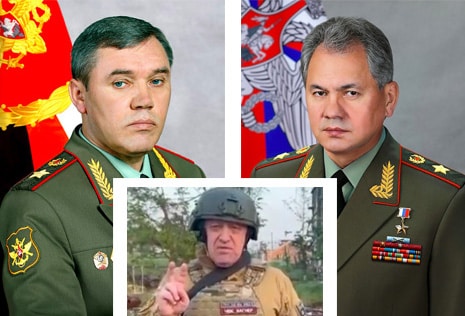Wagner mercenary chief Yevgeny Prigozhin aimed to capture Russia’s military leaders during his two-day uprising over the weekend, the Wall Street Journal reported Wednesday.
According to Journal sources aware of the plot, Prigozhin had aimed to capture Defense Minister Sergei Shoigu and Gen. Valery Gerasimov, the chief of Russia’s general staff, when the pair arrived at the Ukraine-Russian border for a pre-planned visit.
However, the sources said that Russia’s Federal Security Service (FSB) learned of the plan two days before it was executed.
Gen. Viktor Zolotov, commander of the National Guard of Russia, a domestic military force that reports directly to President Vladimir Putin, also said that FSB had learned of the plot ahead of Prigozhin’s “march of justice.”
Specifics regarding “preparations for a rebellion that would begin between June 22-25 were leaked from Prigozhin’s camp,” Zolotov told Russian state media on Tuesday.
The uprising began on Friday, when Prigozhin marched his columns of mercenaries into the Russian city of Rostov near Ukraine’s front lines. Prigozhin said his fighters “blockaded” the town “without firing a single shot.”
It ended Saturday after a deal was reportedly struck by Belarus President Alexander Lukashenko that Prigozhin’s mercenaries would receive immunity, and that charges brought against Prigozhin himself would be dropped, once he turned his columns away from their subsequent march toward Moscow. Before turning back, the mercenaries had come within 200 kilometers of the capital city.
The Journal further reports that Western intelligence officials learned about Prigozhin’s plans ahead of the march by analyzing electronic communications intercepts and satellite imagery.
Prigozhin defended his actions by asserting that the uprising—which he refused to call a “coup”—was intended to be a protest against the prosecution of the war in Ukraine and not aimed at regime change in Russia.
Journal sources said the mercenary chief’s plot ultimately failed after the conspiracy was leaked, and Prigozhin was forced to improvise, acting sooner than he planned by taking Rostov on Friday.
Despite Prigozhin’s failure, the Journal notes that the intel “raises questions about the extent of Putin’s authority” after the Kremlin failed to prevent Wagner fighters from coming virtually within striking distance of Moscow. According to intel, Prigozhin’s uprising relied on his belief that at least part of Russia’s regular military would join the revolt and turn against their own commanders.
According to Lukashenko, Prigozhin was in Belarus as of Wednesday, having left Russia as part of the deal the Belarusian President brokered. The FSB has also dropped all criminal charges against Prigozhin.
Putin in a speech Monday evening promised to drop all charges against the mercenaries—most of whom are convicts who were freed for the purpose of fighting with Wagner—if they joined the regular military through Russia’s Ministry of Defense or simply “go back to their homes.”
PHOTO: ( L-R) Gerasimov and Shoigu, with Prigozhin at center


